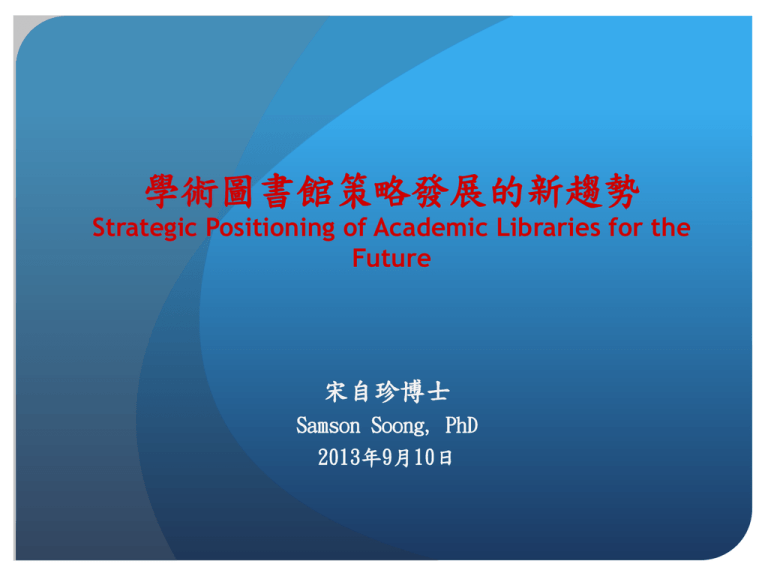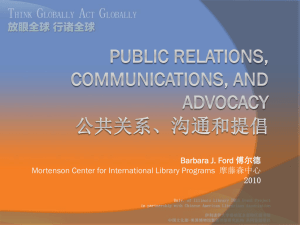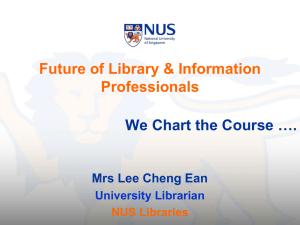影響學術圖書館的新趨勢
advertisement

學術圖書館策略發展的新趨勢 Strategic Positioning of Academic Libraries for the Future 宋自珍博士 Samson Soong, PhD 2013年9月10日 報告大綱 Presentation Outline 1. 學術圖書館的新趨勢 2. 創新服務 Top Trends in Academic Libraries Service Innovation 3. 創建合作空間 Creation of Collaborative Spaces 4. 移動環境策略 Strategies for Mobile Environment 5. 高專業化圖書館 Expert Library 6. 更新組織發展 Organizational Renewal 7. 激進式的合作 Radical Collaboration 8. 結語 Concluding Remarks 廿一世紀的大學圖書館正面臨了規劃觀念上和發 展方式上必需調整的新挑戰。信息技術的快速更新 ,不同以往的教學和學習方法,新的學術交流模式 ,大幅度地改變了學術圖書館使用者對信息發現和 利用的方式和期望。 In the coming years, extraordinary changes in academic libraries will be driven and required by changing information technology, new approaches to learning and teaching, new models for scholarly communication, as well as new ways academic library users will discover and make use of information along with their new expectations. 影響學術圖書館的新趨勢 Top Trends in Academic Libraries 美國大學和硏究圖書館協會的研究規劃和審查 委員出版了“2012年學術圖書館發展的十大趨 勢”和“2013年學術圖書館環境掃描” 來 幫助 學術圖書館對未來妥善規劃和定位。 “2012 Top Ten Trends in Academic Libraries,” published in C&RL News, and the recently released “2013 environmental scan of academic libraries” are the products of a two-year effort by ACRL Research Planning and Review Committee to support the planning and positioning of academic libraries for the future. 影響學術圖書館的新趨勢 Top Trends in Academic Libraries 展示價值: 學術圖書館必須有效說明和 展示他們提供給大學整體的價值。 Communicating value: Academic libraries must prove the value they provide to the academic enterprise. 影響學術圖書館的新趨勢 Top Trends in Academic Libraries 數據庋用: 數據庋用的挑戰不斷增加,不同類 型的數據標準持續發展或改進,更多基於雲計 算的信息數據庫將不斷出現。學術圖書館員和 其他相關信息工作者必須與各類研究團體和社 群合作,以促進這一發展進程。 Data curation: Data curation challenges are increasing as standards for all types of data continue to evolve; more repositories, many of them cloudbased, will emerge; librarians and other information workers will collaborate with their research communities to facilitate this process. 學術圖書館的新趨勢 Top Trends in Academic Libraries 數字化保存: 隨著數字化館藏持續成長成熟, 數字化保護普遍缺乏長遠規劃成為更加關注的 問題。 Digital preservation: As digital collections mature, concerns grow about the general lack of long-term planning for their preservation. 學術圖書館的新趨勢 Top Trends in Academic Libraries 高等教育: 高等教育機構正處于一個動盪期。增 加透過網上教學的結構來提供學位課程是發展趨勢。 高等教育全球化正崛起中,但不少人對大學學位的 “投資回報率”的懷疑也同時增加中。 Higher education: Higher education institutions are entering a period of flux, and potentially even turmoil. Trends to watch for are the rise of online instruction and degree programs, globalization, and an increased skepticism of the “return on investment” in a college degree. 學術圖書館的新趨勢 Top Trends in Academic Libraries 信息技術: 信息技術將繼續影響未來學 術圖書館的想法和作法。 Information technology: Technology continues to drive much of the futuristic thinking within academic libraries. 學術圖書館的新趨勢 Top Trends in Academic Libraries 移動式的環境: 移動式的設備正在快速 改變信息傳遞的方式。 Mobile environments: Mobile devices are changing the way information is delivered and accessed. 學術圖書館的新趨勢 Top Trends in Academic Libraries 讀者帶動的電子書選購: PDA有望成為常態。 但要成為常態,圖書館電子書借用的模式必須 變得更加有持續性。 Patron driven e-book acquisition: PatronDriven Acquisition (PDA) of e-books is poised to become the norm. For this to occur, licensing options and models for library lending of e-books must become more sustainable. 學術圖書館的新趨勢 Top Trends in Academic Libraries 學術交流: 學術交流和出版新模式的發展, 步伐越來越快,學術圖書館必須積極參與和跟 上發展的過程。 Scholarly communication: New scholarly communication and publishing models are developing at an ever-faster pace, requiring libraries to be actively involved or be left behind. 學術圖書館的新趨勢 Top Trends in Academic Libraries 人員編制: 學術圖書館必須透過更具創造性 的方法,包括重新部署和再培訓現有員工,來 發展迎接新的挑戰所需的人力。 Staffing: Academic libraries must develop the staff needed to meet new challenges through creative approaches to hiring new personnel and deploying/retraining existing staff. 學術圖書館的新趨勢 Top Trends in Academic Libraries 用戶的行為和期望: 方便是圖書館用戶在信息 的選擇,取得和使用上最主要的考量。 User behaviors & expectations: Convenience affects all aspects of information seeking—the selection, accessibility, and use of sources. ACRL在“2013年學術圖書館環境掃描”提出一些初步建 議 。 我在這就該文最具影響的一些初步建議,加上本 人的建議和看法,分為下面幾個部份來說明。 -- 創新服務 Service Innovation -- 創建合作空間 Creation of Collaborative Spaces -- 移動環境策略 Strategies for Mobile Environment -- 高專業化圖書館 Expert Library -- 更新組織發展 Organizational Renewal -- 激進式的合作 Radical Collaboration 創新服務 Service Innovation 學術圖書館應該避免簡單地維持現狀,重新 評估收集服務相關數據和圖書館決策的過程, 以利創新服務。 Academic libraries should re-evaluate their service assessment processes to insure they are gathering data and making decisions that will innovate services and avoid simply maintaining the status quo. 創新服務 Service Innovation 為了實施創新的服務模式,學術圖書館 應該持有承擔風險和寬容失敗的準備。 Academic libraries should take risks and be tolerant of failure in implementing new service models. 創新服務 Service Innovation 學術圖書館更應該審慎評估他們的 新舉措,確保服務和資源的創新水平。 Academic libraries should critically evaluate the level of innovation associated with their new initiatives, services, and resources. 創新服務 Service Innovation 什麽算是好的創新? What is good innovation? 史坦福研究圖書館創新獎 Stanford Prize for Innovation in Research Libraries (SPIRL) 該創新獎的評審是基於一個有效和可持續的創新方案 或項目 , 創新的效果必須對該圖書館自己的使用者具有 可測量到的影響 , 對其他研究圖書館有潛在的啓發示範 作用 。 “創新”不限定是信息技術上的改變或更新, 雖然為實現該方案,新信息技術可能會被使用到。 “Awards will be based on a single programmatic or project undertaking and/or a sustained culture and profile of encouraging effective and sustainable innovation; the effect of such efforts must have measurable impact on the library's own clientele as well as the potential for influencing the practices and/or standards of research librarianship generally. The notion of “innovation” need not be inherently about information technology, though it might be assumed that such technology will be employed as appropriate to achieve the programmatic ends of the institution. “ 創建合作空間 Creation of Collaborative Spaces R. David Lankes 建議圖書館員和信息專業人員帶 頭走出傳統圖書館的觀點或比較狹隘圖書館的觀點,努 力創建有效的工作空間,來幫助讀者的協作,解決問題, 並有利於新想法新思維的產生。 R. David Lankes suggests librarians and information professionals should take the lead in heading off a narrower view of the future library and begin creating and managing effective work spaces for collaboration, problem solving, and idea incubation. 創建合作空間 Creation of Collaborative Spaces 學術圖書館應積極與他們的用戶讀者溝 通,以確定和得知他們對空間的需求。 Academic libraries should proactively engage with their users in order to determine space needs and desires. 創建合作空間 Creation of Collaborative Spaces 圖書館應積極嘗試不同的方案和措施, 提供協作或解決問題的空間。 Academic libraries should actively experiment with programs and initiatives offering collaborative or problem-solving spaces. 創建合作空間 Creation of Collaborative Spaces 圖書館也應該繼續尋找與校園上其他 部門合作的機會,來創建更多新的協作空 間。 Academic libraries should continue to look for opportunities to partner with departments and groups on campus to create collaborative spaces. Location Size(平方米) Managing Unit 浸大 BU Learning Commons 圖書館二樓 160 Lib 城大 CU Learning Commons 圖書館 7,500 Lib 中大 CUHK Learning Garden 進學園 圖書館 2,012 Lib Research Commons 研習坊 圖書館 2,448 Lib Learning Commons 館外 798 Lib+ITSC 7x24 Learning Centre 圖書館地面層 300 Lib 圖書館 110 Lib 圖書館總館 3,100 Lib Chi Wah Learning Commons 智華館 百週年校園 6,000 ITSC Information Commons 綜合資訊坊 圖書館地面層 600 Lib Learning Commons 綜合研習坊 圖書館地下一層 1,800 Lib 嶺大 LU Information Commons 圖書館一樓 560 Lib 理大 PU Research Enhancement Centre 圖書館三樓 1,806 Lib 教院 IE Institute’s Learning Commons 港大 HKU 科大 UST Level 3 (Main Library) 移動環境策略 Strategies for Mobile Environment ACRL2013文件不僅討論了個人電腦設備 使用模式的變化和不斷增多的移動應用程序, 並指出 圖 書 館 更加需要多考慮設備的中立性和 利予移動電腦設備的資源。 ACRL’s 2013 document discusses usage patterns, the growing marketplace, mobile apps, and the resulting need for greater considerations of device neutrality and mobile-friendly resources. 依據IDC (International Data Corporation) 的報 導,全球移動設備,包括智能手機和平板電腦,2012年 的總出貨量(8.07億台),比PC出貨量 (3.53億台) 多了 一倍以上。 PC的出貨量實際上從去年下降,這是自 2001年以來第一次發生的情形 。 IDC並指出 , 2014 年 時智能手機出貨量預計將首次超過 10億台,標誌著智 能設備顯著上升的另一個里程碑。 Global shipments of mobile devices more than doubled PC shipments last year. Smartphones and tablets combined for an estimated 807 million units shipped, more than twice the 353 million PC units shipped. Shipments of PCs, meanwhile, actually declined from last year, the first time that has happened since 2001. In 2014, smartphone shipments are expected to pass 1 billion for the first time, marking another milestone in the remarkable rise of smart devices. 移動環境策略 Strategies for Mobile Environment 為了更有效地支持移動登入獲取 (mobile access) 和移動學 習 (mobile learning),我們新的移動戰略 (mobile strategies) 的目標不僅僅是要提供額外的切入點 (add-on access points), 方便圖書館用戶使用資源,而且要方便那些完全依賴於移動設備的 用戶,接入互聯網獲取圖書館資源或其他資訊。 The changes reflected in the charts encourage us to think deeper about library mobile users and do more for them. In support of mobile access and mobile learning, the objective of our new mobile strategy is not just to deliver add-on access points for user convenience, but to facilitate access to library resources for the growing number of library users who rely exclusively on mobile device for Internet access. 移動環境策略 Strategies for Mobile Environment -- 採取以證據為基礎的移動服務開發和實行 移動服務的開發需要探索和創新來驅動,但必須以證 據為基礎的方法來平衡 。 以證據為基礎 , 是要專注了 解用戶的需求和行為,用這方面的了解和知識,來平衡 移動服務的發展,並客觀地評估開發的成功與否。 -- Adopt an evidence-based approach to mobile service development and delivery The mobile service development will be driven by exploration and innovation but must be balanced by evidence-based methodology, focused on understanding user needs and behaviors, employing this knowledge to shape service development, and objectively evaluating the success of the development and service. 移動環境策略 Strategies for Mobile Environment -- 創建學習機會 移動技術創建一個無處不在的學習環境,圖書館用戶 能夠隨時隨地地檢索獲取信息,來滿足他們的迫切需要 。移動服務應支持圖書館的學習政策。鼓勵圖書館用戶 有信心的檢索圖書館的館藏,繼續增長檢索信息的熟練 程度,加強移動學習的能力。 -- Create opportunities for learning Mobile technologies create a ubiquitous learning environment where users are able to retrieve information to fulfill their immediate needs. Mobile services where applicable should support the Library’s learning policy and empower users to access the Library’s collections self-sufficiently, with confidence, ease, and technical proficiency. 移動環境策略 Strategies for Mobile Environment --擴大支持移動服務的舉措和加强所需的基礎設施或後端系統 這包括現有系統需要擴建的基礎設施 , 和新建或尚未 建立的系統 。 這也包括圖書館內部的移動技術專業知識 ,尤其是支持移動內容的收集必要的知識 。 -- Establish and expand the infrastructure and back-end systems required to support mobile initiatives, products and services. This includes both existing system infrastructure which requires expansion and new systems yet to be established. This includes in-house expertise and refers particularly to requisite support for mobile content collection and preservation. 移動環境策略 Strategies for Mobile Environment -- 建立和分享移動服務專業知識 圖書館不同的移動服務將會視情況和需要陸續開發並 推出,新的移動服務相關知識會陸續產生。協助移動服 務的開發評估可以指定給一個己經存在的圖書館委員會 ,或指定給一個新的圖書館委員會,負責溝通,評估, 並建議圖書館移動服務相關的開發和政策。委員會也可 協助移動服務的相關培訓計劃和活動。 -- Build, consolidate and share expertise Different mobile initiatives will emerge over times and new mobile knowledge will be built. Mobile development can be identified as a specific area of interest for an existing or a new library committee, who will communicate, assess, and advise on library mobile related development and policy. The Committee can also support activities such as development of library mobile service related training. Programs. 高專業化的圖書館 The Expert Library ACRL 在2011年出版了 由 Scott Walter 和 Karen Williams編撰的一本書,The Expert Library: Staffing, Sustaining, and Advancing the Academic Library in the 21st Century. 學術圖書館目前面臨重大變革之時,應該擁有或聘用 什麼樣的圖書館員工來服務或支持“校園極其關注” 的新領域,例如支援本科生的研究,資料庋用的策略, 知識產權管理和支持 e-Science / e-research? Walter & Williams introduce the book by asking: in view of the major changes that are taking place in academic libraries, who should we be hiring to provide services in areas of 'critical campus concern' such as undergraduate research, data curation strategy, intellectual property management and supporting eScience or e-Research? 高專業化的圖書館 The Expert Library “2013年學術圖書館環境掃描” 指出 對圖書館專業具有數據庋用管理 (data curation) 能 力 , 數 據 挖 掘 (data mining)能力和分析能力人員的需求,將 不斷增長 。 The ACRL 2013 document: “There will be a growing demand for library professionals with data curation, data mining, and analysis skills.” 高專業化的圖書館 The Expert Library 該文件進一步建議學術圖書館的管理層應蒐集研 究數據服務在他們校園上的需求,並試圖提供這方面的 服務。圖書館管理層應考慮資源的重新分配,並重組的 工作人員,以便在他們的校園上開始提供研究數據服務。 同時,圖書管理層應促進專業發展機會,鼓勵圖書館專 業人員發展數據庋用管理和數據挖掘方面的技能。 Academic library administration should gauge the demand for research data services on their campuses and initiate programs offering these services to their communities; consider the reallocation of resources and reorganization of staff in order to initiate research data services on their campuses; and should promote professional development opportunities that encourage the development of data curation and data mining skills. 高專業化的圖書館 The Expert Library 陳雪華博士 和 陳光華博士在他們新近出版的 “e-Research: 學術圖書館創新服務” 一書中, 有更全方位的建議。 他們提出學術圖書館發展 e-Research 服務的五項建議包括: 制定政策 與永續經營 , 培訓館員與全體共識 , 需求調查 與徵集順序 , 資料組織與系統平臺 , 合作模式 與發展策略。該書對這五項建議都有完整的說 明 。 更新圖書館組織發展 Organizational Renewal 不少學術圖書館組織發展沒有能跟上快 速的信息技術變革是一個不容輕忽的問題 。 A critical issue for academic libraries is the necessity of organizational development to catch up with technological changes. 更新圖書館組織發展 Organizational Renewal 香港科技大學圖書館,在過去四年內作過幾次組織 上的調整。其中比較特殊的是將系統部 (Systems Department) 擴大成系統和數字服務部 (Systems and Digital Services Department) 。 擴大後的部門不僅 包括 Information Commons 和 Learning Commons 服 務單位在內,同時也包括了大學檔案和特藏組,以加强 和提升公共服務單位與系統支援部門的合作伙伴關係。 What has HKUST Library done to renew its organization? Among other changes, Systems Dept was expanded to include IC and LC to enhance working partnerships. 更新圖書館組織發展 Organizational Renewal 更新圖書館組織當然不容易,但組織發展能跟上快 速的信息技術變革和其他新挑戰是一個極其重要的課題 。如果任何圖書館覺得重組不易,還是暫時不作為上, 那讓我簡要地談一下哈佛大學圖書館最近改組,極其困 難但不得不作的一些情形,也許會有助于改變想法。 Reorganization is certainly not easy, but it is essential to align the library structure adequately with the changing environment. The recent difficult reorganization of the Harvard Library may help change your mind. 激進式的合作 Radial Collaboration 圖書館很早就認識到圖書館合作的戰略需要。然而, 學術圖書館在新世紀所面臨的一項挑戰是要突破傳統的 合作方式 。實際上,學術圖書館在面臨各類挑戰之時, 有必要重新思考傳統的合作方式,是不少人的共識。這 樣的作法,已經被稱為激進式的合作,以超越一般的圖 書館合作倡議,大膽實驗創新的合作方式。 Librarians have long realized the need and have frequently engage in library collaboration. The need to rethink traditional methods of collaboration is increasingly recognized in academic libraries. This bold charge has come to be known as radical collaboration, and it challenges libraries to go beyond traditional library collaborative initiatives and to experiment new methods. 激進式的合作 Radial Collaboration 目前激進式的學術圖書館間合作和努力可 以分成三個主要方面的活動:(1) 技術服 務的整合;(2)大型區域性館藏庫的持續增 長; 及(3)館藏建設和資源共享。 Endeavors for radical collaboration in academic libraries can be sorted into three main areas of activities: (1) merging technical services; (2) continual growth of large regional print repositories.; and (3) collection building and resource sharing. 激進式的技術服務協作 Radical collaboration in technical services Examples: -- Orbis Cascade -- OhioLINK -- University of California system’s NextGeneration Technical Services (NGTS) -- 2CUL (Cornell and Columbia University Libraries) 協作建立大型跨區域的存儲庫 Radical Collaboration in Regional Print Repositories Examples: -- Orbis Cascade Alliance -- Pennsylvania Academic Library Consortium -- Triangle Research Libraries Network -- Greater Western Library Alliance -- Western Regional Storage Trust (WEST) 激進式的館藏建設協作和資源共享 Radical Collaboration in Collection Building and Resource Sharing Examples: -- HathiTrust -- BorrowDirect -- Florida Virtual Campus (FLVC) -- JULAC – HKALL, RapidILL 結語 Concluding Remarks 學術圖書館必須追求館藏和服務發展的戰略思維, 以及具有創造性的作法。網絡和移動技術的持續發 展,高等教育全球化和競爭的加劇,以及有限的人 力物力和空間的綜合影響,將在不久的未來需要一 個相當不同的學術圖書館。在此重要的轉型期,學 術圖書館必需重視信息索取的新需要,移動技術的 創新應用,圖書館人力以及組織的更新,有效創建 更多學習合作空間。 The combined impact of information and mobile technologies, the globalization of higher education, and increased competition for resources and spaces will require a rather different library in the academy in the coming decade. 結語 Concluding Remarks 透過不斷的戰略發展以及激進式的圖書館合作,未 來的學術圖書館,將會成為更具創業精神的資訊傳遞中 心,更廣泛的學術和研究信息服務提供者,更有效地支 援學術資訊的創建, 保存和使用。學術圖書館同時也會 成為校園上極其重要的學習新基點,以及校園上整合電 子資源使用和學習技術應用到教學工作的樞紐。 With these strategies, academic libraries will be more effective in information management and delivery and in the application of technology to information creation and use, providing essential information services to broader academic and research communities. Academic libraries will also become campus hubs for learning and for the integration of learning technology and digital resources into academic learning and teaching. Thank you!






